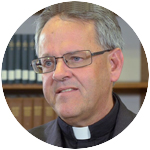
Father Thomas Dailey, O.S.F.S.
Pope Francis’s recent comments on “civil unions” have led to widespread confusion, even controversy. (Ryan Anderson and Robert George offer a superbly reasoned response with a plausible interpretation.)
Added consternation centers on the lack of official clarification. For John Allen, “Francis and his team know full well what most people think he said and haven’t done anything to correct it, which means, as things stand, they own the impression.” Christopher Altieri suggests that the Vatican may be happy not to change the narrative.
But I wonder whether the disturbance derives from different ways of communicating. Do ambiguous words left unclarified serve a (good) purpose?
Clearly, this pope expresses himself in ways to which we are not accustomed. Some may question its appropriateness and effectiveness, but Pope Francis’s brand of communication accords with “what you see is what you get” – which can be both invigorating and exasperating!
Heritors of a scientific worldview, we are accustomed to thought that proceeds logically and speech that expresses it precisely. We prefer clarity communicated “in” a statement – which is why we often cite church documents and quote saintly sayings.
[hotblock]
Pope Francis approaches informal conversations differently. His comments push people toward a clarity more emergent than stated, one that comes “from” or “out of” things said (eventually, hopefully). His homespun stories and images use idiomatic language and familiar pictures, rather than logical propositions, to suggest understanding.
That way of communicating invites people to think and talk more, to consider further, to ponder possibilities. It’s an engaging communication “out of” which emerges not a new or changed teaching but a greater understanding that reflects time-honored truth in the fuller context of “where we are” now. That’s what his recent encyclical (“Fratelli Tutti”) proposes.
Consider how Pope Francis told young people in South America they should “make a ruckus! … a ruckus that brings a free heart … that brings solidarity … that brings us hope, a ruckus that comes from knowing Jesus and knowing that God, once I know him, is my strength.” Out of the mess they make (and which, he adds, they should help to clean up!) will come a greater clarity regarding themselves and their future.
Pope Francis often calls for boldness in speech. Kevin Brown explains this “parrhesia” as inviting courage in the face of opposition and fervor in view of moving forward. A truly “bold” approach neither hides the speaker’s intention nor seeks to manipulate the hearer’s understanding. It is communication coming from charity and intended to discern a response to the Spirit active in today’s world.
In the preface to a book of interviews, Pope Francis admits favoring this approach. “I try to answer spontaneously in a conversation that I intend to be easily comprehensible, and not using rigid formulas. I also use simple, colloquial language. For me, interviews are a dialogue, not a lesson.”
[hotblock2]
Why does he prefer to dialogue with journalists through mass media? “I want a church that is able to find its way into conversation between people, a church that knows how to engage in dialogue. It is the church of Emmaus, in which the Lord ‘interviews’ the disciples who have become discouraged. For me, the interview is part of that conversation between the church and the people of today.”
Nevertheless, the pope does acknowledge the potential problem. He laments being taken out of context, but adds, “just as I mustn’t lose my prudence, I mustn’t lose my trust either. I know that this can make me vulnerable, but it’s a risk I’m willing to take.”
The latest kerfuffle may make us wonder whether he should take that risk.
Seeking clarity in what emerges from dialogue presumes that the subject matter is unclear or unsettled. But church teaching on marriage is definitive and clear, as Tim Gray wisely assures us.
A documentary may not be the best place for papal dialogue. Mass media does give a broad reach to church teaching, with a “new genre of papal language” that Francis Rocca suggests gives the pope an influence inversely proportional to the official character of his words! Still, the Holy Father must know by now that his person-to-person conversations are never simply that, but always worldwide news.
Does the commotion coming from the pope’s words have any real benefit for the faithful? I think that Pope Francis thinks it does.
Even if clarity does not emerge as quickly as the news cycle demands, and even though “popesplaining” is often awkward and occasionally tiring, the shared work of sorting out meaning and coming to a deeper appreciation of the truth is what “faith seeking understanding” is all about. Developing a mature faith is difficult. But it can also give real significance to what we believe amid the important challenges we face in today’s world.
***
Father Thomas Dailey, O.S.F.S., is the John Cardinal Foley Chair of Homiletics and Social Communications at St. Charles Borromeo Seminary, Wynnewood, and a research fellow for the Catholic Leadership Institute in Malvern.
PREVIOUS: Powers of the soul can counter social media engineering
NEXT: This Election Day, ‘render unto God’ by transforming the culture


Share this story